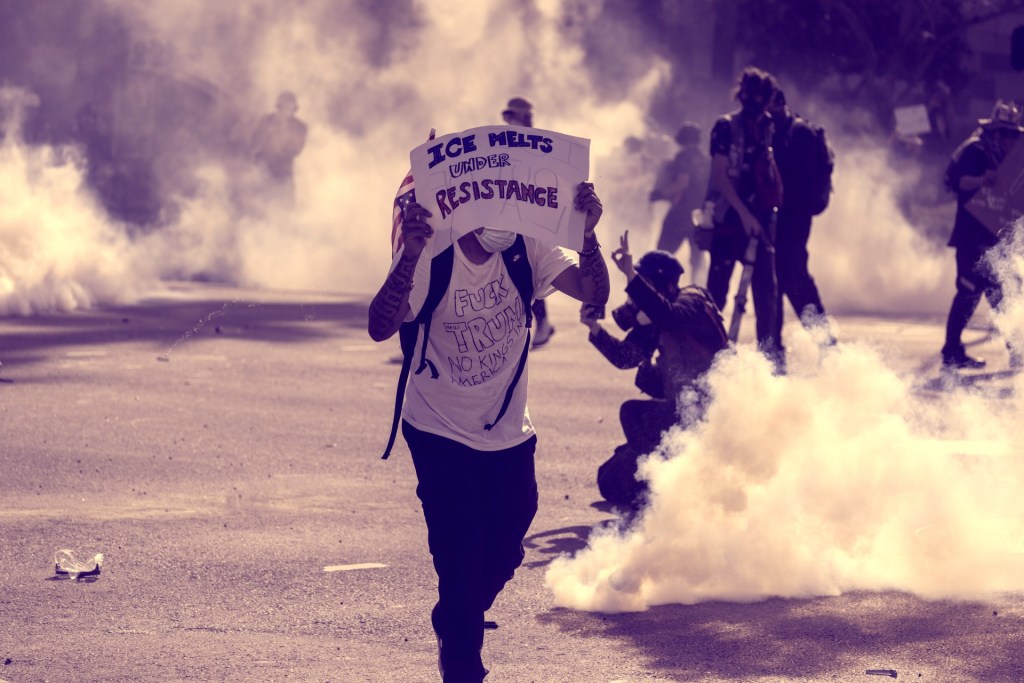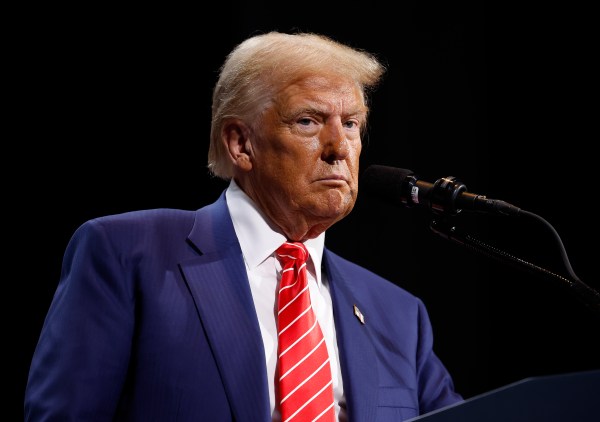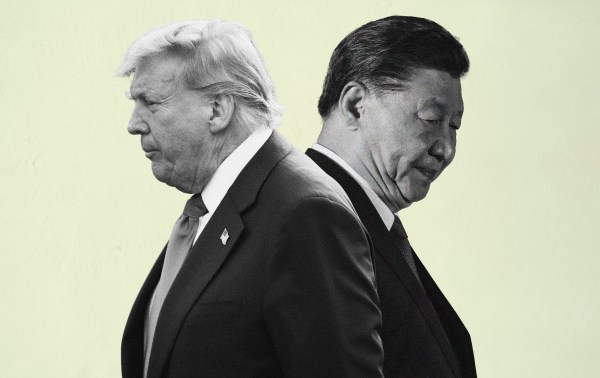You are receiving an unlocked version of Boiling Frogs. To receive Nick’s column every evening, join The Dispatch today.
The closest I get to feeling sympathy for Donald Trump is when I’m reminded that he leads a country of silly people whose deepest political conviction is that there is such a thing as a free lunch.
I never arrive at actual sympathy for him because he wouldn’t be president if Americans were different. But I would understand if he looked at his polling with bewilderment and wondered, “What the hell do these voters want?”
As a candidate, he promised new tariffs. He won. He imposed those tariffs. Americans didn’t like them.
As a candidate, he warned that Iran couldn’t be allowed to have a nuclear weapon. He won. He bombed Iran’s nuclear program. Americans didn’t like it.
As a candidate, he vowed to deport illegal immigrants en masse. He won. He’s begun raiding workplaces to round up those immigrants. Americans didn’t like it.
Here’s who Americans are. They’re a population that wants the budget balanced without cutting entitlements, that wants jobs repatriated without protectionism, that wants Iran disarmed without military force, and that wants illegal immigrants removed without any rough stuff. One free lunch after another, as far as the eye can see.
A message from SCOTUSblog
Understand the Decisions Shaping Our Nation
From breaking alerts to expert analysis, get comprehensive Supreme Court coverage delivered straight to your inbox. SCOTUSblog delivers expert analysis on every decision, plus daily news briefings you can’t find anywhere else.
They’re a people that reliably complains that the federal government spends too much and then, when offered a list of programs to cut, insists that the feds should spend more on nearly every one.
They’re unserious about policy to the point of incoherence. When we ask ourselves what sort of mandate Donald Trump has as president, we’re looking for logic in an entity driven by impulse. It’s like asking a small child to explain his “reasoning” in wanting a cookie.
Even so, at the very least, we might assume that they’ve given the president a mandate for ruthlessness. The one neat trick of every strongman is assuring the public that any problem can and will be solved easily if only enough pain is inflicted on the cause of it. Crack down on illegals, crack down on criminals, crack down on trade, crack down on Iran: When all you have is a hammer, everything looks like a nail.
Americans voted for that. They elected a guy who ran for president, explicitly, on retribution. Trump had every reason to believe they would indulge him in displays of ruthless “strength.” Yet every time he tries, his polling tanks.
Including, surprisingly, on his pet issue.
An immigration backlash.
“The LA Riots Are a Trump Ad,” Ruy Teixeira proclaimed in a June 9 piece for The Free Press.
Teixeira is a liberal political analyst who spent the last few years warning Democrats that they’re out of touch with the working class on cultural flashpoints like trans rights and border enforcement. On November 5, that turned out to be prescient. Now here he was, back again to remind progressives that violent unrest paired with the flying of foreign flags is a nationalist fever dream come true.
It’s precisely the sort of dystopian civil disorder that might drive voters into the arms of a strongman looking for excuses to show ruthlessness. And Trump did show ruthlessness: He sent in the troops. He gave us the rough stuff.
Americans don’t like it.
Multiple polls taken afterward found the public opposed on balance to his decision to deploy the National Guard and Marines to Los Angeles. In fairness, those polls referred to what was happening in the city as “protests” rather than “riots,” a term that might have provoked a firmer law-and-order response. But the mayhem in L.A. was extensively covered in the press. And Americans were primed, one would think, to give the president wide latitude in handling that mayhem.
Not so. On the contrary, numerous polls tracked by Nate Silver and RealClearPolitics saw Trump’s approval on immigration start to slide right around the time that he intervened in L.A. On June 9, immigration was the only one of four major issues (trade, the economy, and inflation were the others) on which the president was net positive in Silver’s tracker. Today he’s 5.3 points underwater, a net decline of around 9 points overall in 17 days.
His numbers on immigration also took a dive in April, when he went from a net approval of 6.8 points in Silver’s calculus to net disapproval of 2.5 points in little more than three weeks. What was happening in April? Right—that’s when the media was digging in on the saga of Kilmar Abrego Garcia and other accused gang members who were shipped off to El Salvador without due process. Again, Trump gave Americans the rough stuff. And again, we didn’t like it.
He’s gotten rough in another facet of enforcement recently too, pivoting away from a “deport the criminals first” approach and instead targeting nonviolent illegal immigrants in order to boost arrest numbers. If Americans are happy about that, his approval on immigration certainly doesn’t show it. At least one prominent belated convert to Trumpism is outspokenly, profanely unhappy about it:
You can imagine an irritated Donald Trump watching that clip and thinking back to his rhetoric during the campaign, wondering, “What part of ‘mass deportation’ did you not understand?” But he has only himself to blame for the confusion. The president has always presented illegal immigration as first and foremost a problem of public safety, from posting the mugshots of deportees convicted of crimes on the White House lawn to turning victims of immigrant crime like Laken Riley into rallying cries.
Americans almost unanimously support deporting violent criminals, but barely muster a majority on deporting nonviolent criminals. Go figure that Joe Rogan and other “soft” Trump supporters might feel baited-and-switched by having their candidate’s priorities shift suddenly from fighting killers and rapists to fighting restaurant dish-washers.
The shift has been sharp, too. Recent nonpublic data compiled by Immigration and Customs Enforcement (ICE) and obtained by the Cato Institute reveals that, since October, 65 percent of illegal immigrants detained by the agency have no criminal record and 93 percent have no record of violent crime. The number of illegal immigrant criminals arrested is up since last year, but the number of immigrant non-criminals detained has lifted off like a rocket. That’s exactly what we’d expect “mass deportation” to look like. Yet a lot of people who voted for it seem not to like it.
Why not? Could it be that the American conscience has been shocked by the rough stuff?
The puke test.
I’m reluctant to concede that, lest I, er, repudiate the central thesis of this newsletter. “Maybe the frogs haven’t boiled after all” would be a tough pill to swallow after 700 or so editions.
Besides, the numbers don’t support the argument. Trump’s overall job approval is slightly higher than Barack Obama’s was at this point in his second term. It’s been basically flat in Silver’s tracker since the “Liberation Day” tariffs despite the sturm und drang around Abrego Garcia, the L.A. crackdown, and the workplace immigration raids. If the frogs aren’t quite boiling, they’re comfortable at a vigorous simmer.
But yes, to be fair, I do think that the president’s policies are failing the puke test for some Rogan-esque voters. Videos of ICE manhandling suspected illegal immigrants go viral routinely nowadays on social media. This one, which captured the father of three U.S. Marines being pummeled before his arrest, became a sensation. A story about another Marine’s Mexican-born wife being packed off to an ICE detention center also spread widely. In another case, an Army veteran who received the Purple Heart and who’s lived in the U.S. for 48 years was given three weeks to decide whether to self-deport to his native South Korea or be forcibly deported there. (He chose the former.)
There’s much more where that came from. And now that the Supreme Court has signed off on Trump’s plan to deport immigrants to countries they’re not even from, we can look forward to lurid tales of people being dumped into war zones where they don’t speak the language and ending up captured or killed.
Some ambivalent Trump voters must be taking all of that in and feeling queasy. Postliberalism treats ruthlessness as strength and conscientiousness as weakness, but by no means are all of the president’s supporters postliberals. Many of them, especially the ones in the middle who tipped the election to him, are merely well-meaning children who couldn’t or wouldn’t consider the perfectly foreseeable consequences of the policies they voted for.
Dumb but still more or less moral: If that’s where the balance of political opinion in America now lies, I guess I’ll take it.
There’s polling to back it up, in fact. On January 19, the day before the inauguration, Axios found support for deporting illegal immigrants at a robust 66 percent. But—and tell me if this sounds familiar—when the poll delved into specifics the respondents got cold feet. Just 38 percent supported using the military to find illegals and even fewer respondents favored deporting those who came here as children, as the Army veteran I mentioned above did.
As with slashing federal spending, silly Americans love the idea of mass deportation in principle, but balk as soon as they’re reminded that it won’t be a free lunch morally. I speculated yesterday that “vibes” more so than policy was the difference for Zohran Mamdani in New York’s Democratic mayoral primary, but the same was likely true for the president among decisive voters last fall. Forced to choose between Trump and Kamala Harris, they preferred strong “vibes” on immigration to weak ones.
The problem with electing someone based on “vibes” is that you’re susceptible to being unhappy, even mortified, once he starts doing the particular things he promised to do. “Sure, I expected ‘strength’ on immigration—but who said anything about rough stuff?!” Never mind that Trump explicitly warned that his enforcement agenda would be a “bloody” story, for cripes’ sake.
A candidate elected on “vibes” has no mandate on policy. Watch out, Zohran!
And insofar as Trump does have a policy mandate, it may be no different from the one Mamdani has in New York. The hero of the American right and the new heartthrob of the American left each campaigned primarily and successfully on reducing the cost of living. Some untold number of Trump voters surely tilted his way feeling either ambivalent about or hostile to his plans for mass deportation but concluded that he was the least bad choice on the ballot after four years of inflation. Now the bill has come due and they’re getting the downside of that bargain, but not the upside. No wonder they’re grumpy.
Trump is so prone to dishonesty and hype, and so given to taking all sides of an issue, that he may not be capable of being anything more than a “vibes” candidate to anyone except nationalist ideologues. For nearly 10 years the debate has raged over whether to take him seriously or literally; at campaign events as late as October 2024, his supporters confidently assured reporters that he didn’t intend to keep his policy promises. It’s a testament to how prodigious his skill as a B.S. artist is that individual voters can view him as radically or as moderately as they prefer.
But eventually he has to govern by settling on a policy and that’s when his proficiency in “vibes” comes back to bite him. Tariffs on every country in the world? Bombing Iran? Rounding up Mexicans at Home Depot? I didn’t vote for that!
Time to boil.
There’s a more cynical possibility for why Americans haven’t developed the stomach for some of Trump’s rougher stuff.
It’s not because the frogs are too decent and soft-hearted to let themselves boil, it’s because the president won’t let the water come to temperature. He keeps walking back his more outré policies instead of giving voters a chance to become desensitized to them.
Abrego Garcia is back in the United States. Israel was pressured into holding its fire at Iran less than 72 hours after the U.S. joined the war. The “Liberation Day” tariffs were paused after one week. Even mass deportation was also briefly paused before it was unpaused. As recently as last Friday, Trump hedged on workplace raids by warning that “we can’t put the farms out of business” and “we don’t want to hurt people that aren’t criminals.”
For a term-limited aspiring autocrat, he has a weirdly low tolerance for political pain. Maybe that’s because he lacks strong policy convictions or maybe it’s a narcissistic response to fear of being unpopular. Either way, that “TACO” jab didn’t come from nowhere. Perhaps he simply hasn’t kept the heat high enough for a boil.
But if you want to be more optimistic than that about Americans, here’s the best I can do: Their insatiable, idiotic appetite for free lunches might plausibly cause a backlash to Trumpism when the president inevitably fails to satisfy it.
At the risk of overinterpreting the results of an off-year municipal party primary, another way to understand Zohran Mamdani’s surprise win is that it’s the latest case of silly Americans reacting “thermostatically” to politics. The left takes power and swing voters recoil at their policy excesses, moving toward the right; then the right is elected and the process repeats in reverse. Opinion on immigration is particularly notorious for behaving thermostatically. We’re all swinging on a pendulum of backlashes and counter-backlashes.
If Trump 2.0 could polarize New York City Democrats to the point where they’re willing to nominate a Muslim socialist for mayor, it might polarize swing voters into hopping out of the pot on mass deportation. Having to face the human cost of the president’s immigration policies day after day could send them scrambling toward the left in 2026 and 2028 in search of a more humane border agenda—which they’ll embrace right up until the moment they’re reminded that that agenda also has trade-offs.
Backlashes happen when presidents misread their mandates. Consider the possibility that Donald Trump’s mandate on immigration, if he has one at all beyond tightening the border and deporting criminals, isn’t as broad or deep as he and his fans like to believe. “If liberals insist that only fascists will enforce borders, then voters will hire fascists to do the job liberals refuse to do,” David Frum wrote in 2019. If fascists insist that borders can only be enforced in ways that disgust voters, what happens then?
Our moronic politics is an endless search for free lunches. America’s leaders do their best to provide those free lunches by hiding the cost, which is why our debt is what it is, but in some cases there’s no way to do so. Immigration is one of those cases. How steep a price in rough stuff are swing voters willing to pay?
A message from SCOTUSblog
It’s Called SCOTUSblog For a Reason
Get the Supreme Court coverage other outlets can’t match. Breaking news, detailed opinion analysis, and daily roundups from SCOTUSblog’s expert team. Join informed readers who understand the biggest decisions shaping America’s future.












Please note that we at The Dispatch hold ourselves, our work, and our commenters to a higher standard than other places on the internet. We welcome comments that foster genuine debate or discussion—including comments critical of us or our work—but responses that include ad hominem attacks on fellow Dispatch members or are intended to stoke fear and anger may be moderated.
With your membership, you only have the ability to comment on The Morning Dispatch articles. Consider upgrading to join the conversation everywhere.